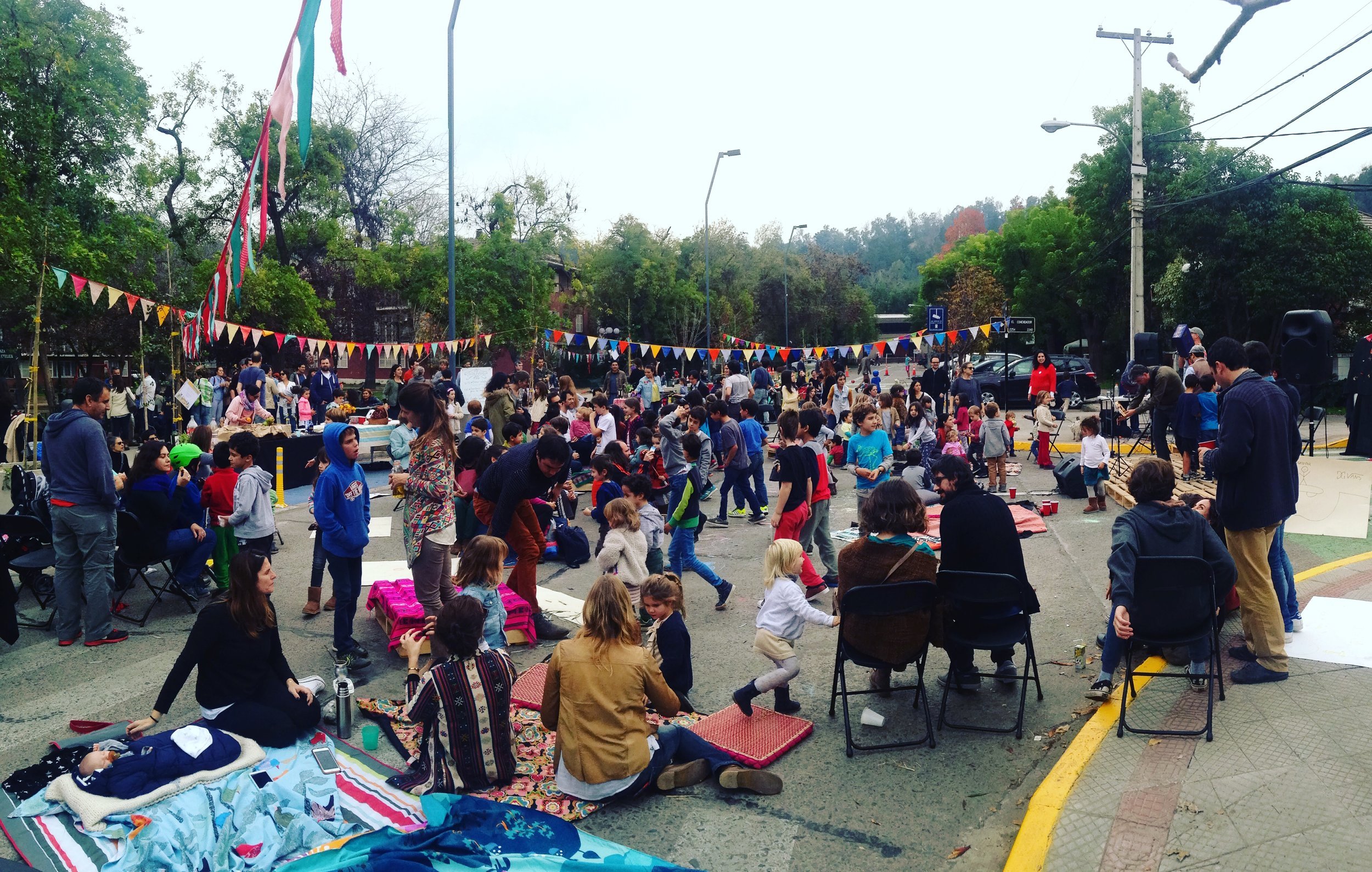How our Malones Urbanos (Urban Potlucks) Impact Public Safety and Social Cohesion
Malón Urbano in Santiago. Avenida Padre Letelier, Pedro de Valdivia Norte neighborhood. Conducted by Junta de Vecinos Pedro de Valdivia Norte with support of Ciudad Emergente. (2015).
“Findings from the study show that Urban Potlucks did reduce crime in the neighborhoods analyzed. Results indicate a nearly 21% decrease in the number of police incidents (reports filed and arrests made) within 100 meters of where the Urban Potlucks were held.”
Article by Daniel Sax:
Urban Potlucks — Ciudad Emergente’s response to public safety concerns
Public safety has, for years, been a major concern for Chileans. A 2023 report published by Ipsos highlights this fact, showing that, of all Chileans surveyed, 85% perceived of an increase in safety related problems over the past year. These perceptions are consistent with 2022 findings from the Centro de Estudios y Análisis del Delito (Center for Crime Research and Analysis) that showed a 44.6% increase in criminal charges and arrests in Chile compared to the year prior. These data have reignited a weathered debate among politicians and academics: what methods can we use to increase social capital and foster strong neighborhood relationships in an effort to reduce crime?
Enter Ciudad Emergente’s Urban Potlucks (Malones Urbanos) — an initiative designed to foster and strengthen community bonds through short-term programming leading to long-term changes in social relationships within a neighborhood. To achieve this goal, public space is annually transformed into a community gathering space where neighbors can share a meal and engage in meaningful conversation. In doing so, they begin to establish trust and lay the foundations for increased social capital. Urban Potlucks have been successfully implemented across Chile, as well as in Guatemala, Peru, Colombia, Argentina, Mexico, and the United States. What’s more, the program has gained global attention and was included as a social cohesion initiative in the United Nations’ 2021 Catalogue of Best Practices to achieve the UN’s Sustainable Development Goals. However, despite this recognition, the program’s impact has yet to be quantified. Although there has been abundant positive feedback from those who have taken part in the Urban Potlucks, an external evaluation can help to identify points of improvement for the program, as well as offer concrete justification for its use in the future.
“The crime most reduced by the program is car theft, which saw an almost 18% decrease. This is an important finding considering that, in 2022, the Carabineros de Chile reported an increase in car thefts of 121% from the year prior.”
The report: methods and findings
To conduct this research, Ciudad Emergente teamed up with the Universidad Autónoma de Madrid in Spain and the Universidad de Los Andes in Chile to evaluate the impact of Urban Potlucks on crime levels in neighborhoods where it has been implemented. Focusing specifically on Urban Potlucks implemented in 2018 and 2019, researchers Jorge García Hombrados (Universidad Autónoma de Madrid) and Andrés Barrios Fernández (Universidad de Los Andes) led a comparative study looking at differences in crime rates between neighborhoods that had hosted the event and those where there was no intervention. For their analysis, they first identified areas with comparable socio-economic demographics, crime rates, and similar numbers of active community and neighborhood organizations in the years prior to implementing the Urban Potlucks program. Then, they compared changes in crime statistics overtime — drawing data from police records, census data, and NGOs reporting on neighborhood-level crime — to see what measurable impact the Urban Potlucks may have had.
Excitingly, findings from the study show that Urban Potlucks did reduce crime in the neighborhoods analyzed. Results indicate a nearly 21% decrease in the number of police incidents (reports filed and arrests made) within 100 meters of where the Urban Potlucks were held. What’s more, this impact was shown to increase over time. The crime most reduced by the program is car theft, which saw an almost 18% decrease. This is an important finding considering that, in 2022, the Carabineros de Chile (Chilean police force) reported an increase in car thefts of 121% from the year prior. Complementing the quantitative results offered by the research study, surveys administered by Ciudad Emergente to residents who had participated in Urban Potlucks indicated a strengthening of social bonds and community cohesion. According to those surveyed, Urban Potlucks have helped increase communication among neighbors on important topics, such as safety in the neighborhood, as well as foster communication through the exchange of contact and social media information.
Remaining questions and next steps for Urban Potlucks
Even though the research study demonstrated positive outcomes from the Urban Potlucks, questions remain for Ciudad Emergente concerning the ways in which the program improves social capital: What dimensions of social capital are impacted by the intervention? Can the decrease in crime associated with Urban Potlucks be attributed to the adoption of community-led crime prevention strategies? If so, what are those strategies? Responding to questions like these through additional research trials is an essential step towards understanding and improving the program. The evidence generated will not only benefit the implementation of the Urban Potlucks, but, in addition, stands to influence how public safety is approached in policy, an impact relevant to all Chileans.
More information:














